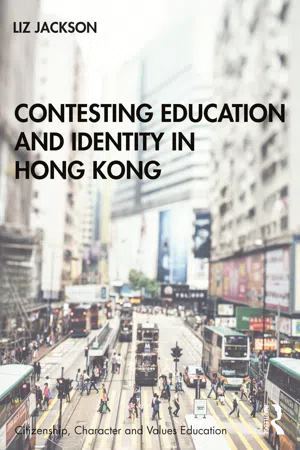An imagined community
Anderson argued that modern societies are different from those in the past and that the age of the nation-state has been marked by distinctive processes of social and political imagining. As he wrote, national communities ‘are to be distinguished, not by their falsity/genuineness, but by the style in which they are imagined’ (1983, p. 6). This ‘style’ can be thought of in terms of the substance and the quality of the imagining: how a community is imagined as an active process, and the impact of that process on what it is that is imagined.
For many people, their national community and civic identity seems fixed, static, and solid. It seems simply ascribed by birth, before it is actively learned through socialisation processes, at home, in society, and in school. In contrast to this experience, in Hong Kong civic identity has been and continues to be actively imagined, reimagined, and contested.
From a global view, Hong Kong’s identity has been dynamic and contested in the modern era. Hong Kong was a trading port in the domain of Chinese dynasties before it was occupied by and became a colony of the United Kingdom in the mid-nineteenth century. It was ‘returned’ to the People’s Republic of China (PRC) in the 1997 handover according to the terms of the 1984 Sino-British Joint Declaration. Academic and political debates have considered Hong Kong’s political status, for example, as liberal democratic (e.g. Lai & Byram, 2012) or non-liberal democratic (e.g. Bhowmik & Kennedy, 2016) under the terms of the ‘one country, two systems’ political arrangement as a special administrative region.
Meanwhile, the people of Hong Kong have experienced more complex transformations of their civic and national identities over the decades (Lui, 2019). For Hong Kong people of Chinese descent, this has involved such labels as: British Subjects, British Dependent Territories citizens, British Nationals Overseas, Hong Kong Permanent Residents, and citizens of the Hong Kong Special Administrative Region (Ai, 2002; Chong, 2017). Other groups in Hong Kong have had different experiences in developing and attaining national identities. For example, some ethnic minorities effectively became stateless as a result of the handover (Erni & Leung, 2014).
What makes different groups of people identifiable as ‘Hongkongers’ (a word added to the Oxford English Dictionary in 2014) in the present-day is debated from legal, cultural, political, educational, and other perspectives. A white United States citizen, I became a legal permanent resident of Hong Kong after seven years of living and working continuously in the region. But that does not mean I am a Chinese (PRC) national. Nor does it mean I am met with a sense of absolute belonging by all members of the society. As is the case for many long-term, permanent migrants and resident ‘newcomers’ in their adopted homelands, my status as a de facto ‘local’ remains debatable. When I ask my (Hongkonger) students if I am a Hong Kong person in their eyes, their responses can be reluctant and ambivalent. Beyond what the law says, they may consider pertinent such matters as my length of stay here, my ethnicity and race, and my lack of Cantonese and Chinese literacy.
The debate over who is Hong Kong, what distinguishes this particular imagined community from a political view, received worldwide attention most recently in relation to the 2019 anti-extradition law protests. Though the legal proposal prompting the protests was quickly suspended by the government in an apparent response to the growing unrest, its prospect rekindled fires from the Umbrella Movement, and earlier protests in the region’s recent history (Lee & Chan, 2011). Protesters demanded not only complete withdrawal of the proposed bill, but also swift implementation of universal suffrage, among other demands, related to police accountability and the release of arrested protestors. After a brief pause, as people avoided gatherings during the height of COVID-19 in Hong Kong, the movement shifted in mid-2020, as another national security law was proposed and quickly passed in Beijing, which many perceived to further threaten Hong Kong’s already limited and decreasing sense of political autonomy.
Like the Umbrella Movement, these recent series of protests and related dissent actions signal to the world some Hong Kong people’s desires for (some level of) autonomy and recognition as separate and distinct f...
